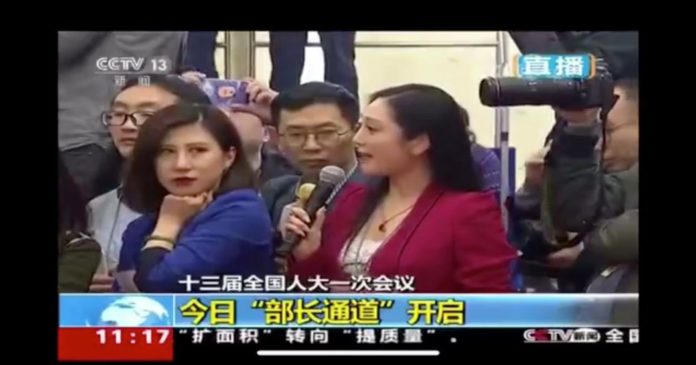On Chinese social media, GIFs and other online riffs inspired by Ms. Liang’s epic eye roll quickly proliferated, and by evening they were being deleted by government censors. Ms. Liang’s name became the most-censored term on Weibo, the microblogging platform. On Taobao, the freewheeling online marketplace, vendors began selling T-shirts and cellphone cases bearing her image.
In one video, three men did a deadpan recreation of the incident. On Ms. Liang’s Weibo account — which quickly soared to 100,000 followers and kept climbing — supporters flooded her with jokes and comments of support.
“You are the only thing I remember since the beginning of the National People’s Congress,” one commenter wrote. Another saluted “an eye-rolling representing all people who don’t dare to do so.”
On the messaging app WeChat, people jokingly separated Ms. Liang and the questioner into two parties based on the color of their clothing. Many said they supported the blue party, in reference to Ms. Liang. The questioner, Zhang Huijun, wore red — the color of China and the Chinese Communist Party.
Before posing her question to the government official, Xiao Yaqing, Ms. Zhang had introduced herself as the operating director of American Multimedia Television U.S.A., a Los Angeles-based broadcaster that has had partnerships with Chinese state-run television in the past, according to its website. Its president, Jason Quin, also lists himself on LinkedIn as the president of the Confucius Institute of Education, which describes itself as a nonprofit organization working on entrepreneurial education.
News outlets with ties to the Chinese government are often chosen to ask questions of China’s rarely available political leaders at the National People’s Congress, while more mainstream local and foreign outlets are seldom called on. Neither Ms. Zhang’s employer nor Ms. Liang’s responded to a request for comment on the incident Tuesday.
For the record, Ms. Zhang’s question was as follows:
“The transformation of the responsibility of supervision for state assets is a topic of universal concern. Therefore, as the director of the State-Owned Assets Supervision and Administration Commission of the State Council, what new moves will you make in 2018? This year marks the 40th anniversary of the Reform and Opening-up Policy, and our country is going to further extend its openness to foreign countries. With General Secretary of the Chinese Communist Party Xi proposing the One Belt One Road Initiative, state-owned enterprises have increased investment to countries along the route of One Belt One Road, so how can the overseas assets of state-owned enterprises be effectively supervised to prevent loss of assets? What mechanisms have we introduced so far, and what’s the result of our supervision? Please summarize for us, thank you.”
An earlier version of this article referred incorrectly to Jason Quin, the president of American Multimedia Television U.S.A. Mr. Quin is also the president of the Confucius Institute of Education, which is unrelated to the Confucius Institutes supported by the Chinese government; he is not the president of a Los Angeles Confucius Institute.
Source : Nytimes













